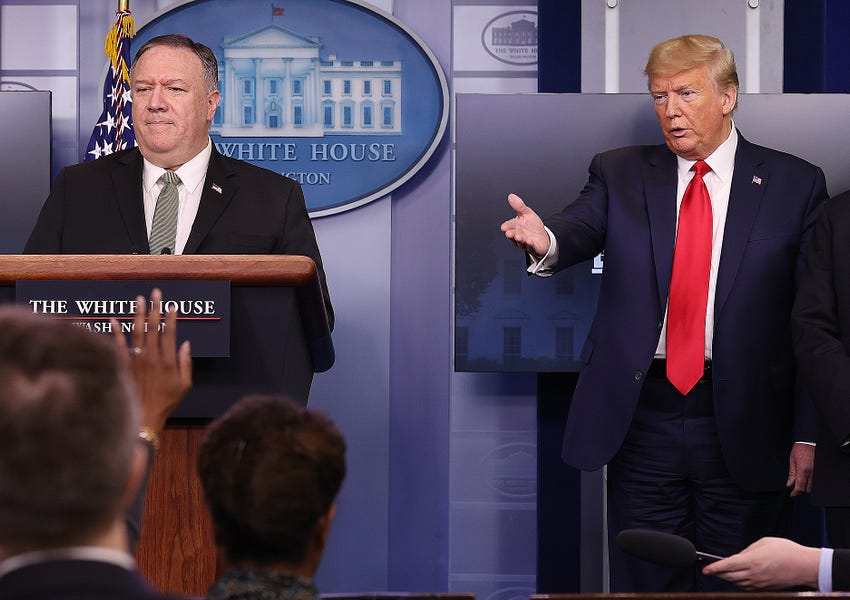The future is particularly murky these days. It’s anybody’s guess how the pandemic, the presidential election, and the economy are going to play out. Just about the only thing that’s assured is that U.S. relations with China will never be the same.
Businesses are radically rethinking their supply chains, and whether you call the rest of us voters or consumers, attitudes toward China are souring. A Harris poll last month found that two-thirds of Democrats and 9 out of 10 Republicans hold China responsible for the spread of the coronavirus. Already, a slew of lawsuits have been leveled against the Chinese government. The West’s political orientation toward China is shifting too, as countries around the world increasingly point fingers at Beijing.
The issue isn’t whether a China-U.S. reckoning is coming, only whether we’re smart or dumb about it.
Early on, the knee-jerk response from Democrats, the World Health Organization, much of the media, and the Chinese government itself was to claim that any criticism of the Chinese government’s actions was bigoted or xenophobic.
On the merits, this is ridiculous. The Chinese government is a cruel, oppressive regime. Its refusal to be transparent and cooperative with the international community has been outrageous, and it’s not bigoted to say so. But the Communist Party of China is not “the Chinese” or even “China,” and blanket-blaming a whole nation and its people for a pandemic makes no sense. It’s as dumb as stipulating that any negative word about Beijing is xenophobic.
The current debate over the origins of SARS-CoV-2 is another excellent example of how dumb we can be about criticizing China. The claim that the virus originated in a Chinese lab is not synonymous with the deranged conspiracy theory that China created the virus and purposefully unleashed it.
There’s no evidence that the virus is manmade; scientists would be able to tell with genetic sequencing. Nor is it plausible that China’s interests would be served by the deliberate release on its own soil. A more credible (but unproven) theory is that the Chinese were studying the virus and it was accidentally released. Or it may have emerged “naturally,” as the Chinese government contends, from a Wuhan meat market.
As the question of where the virus came from has heated up, Republican China hawks, in and out of the Trump administration, rarely volunteer that they don’t mean “manmade” when they say “originated.” And much of the media coverage similarly ignores or downplays this distinction. Some pro-Trump media personalities seem eager to fuel anti-Chinese sentiments, while the anti-Trump crowd seems to prefer to see a more mockable conspiracy theory.
This mutually beneficial ambiguity gets a boost from the administration’s vacillation over how much blame it wants to assign to China and how it wants to direct it, all with an eye toward riling up Trump’s base and distracting from early missteps in combating the pandemic.
On one hand, President Trump values his personal relationship with Chinese President Xi Jinping and covets a major trade deal with him. Trump is on the record praising Xi’s coronavirus leadership and remains reluctant to criticize Xi directly. On the other hand, Trump and many of his advisers and surrogates relish having a new evil empire to galvanize support around.
(The schizophrenic nature of all this is ironically analogous to conservative criticism of the Trump administration. A herd of pro-Trump politicians and media figures are sharply critical of the administration’s response to the pandemic while simultaneously refusing to criticize Trump. The result is heated talk of states needing to be “liberated” from governors following the president’s guidelines and presidential advisers being scapegoated for presidential decisions.)
The ambiguity about China’s misdeeds was on display during the Sunday talk shows.
When Secretary of State Mike Pompeo told ABC’s Martha Raddatz that “China has a history of infecting the world,” Raddatz admirably asked, “Do you believe it was manmade or genetically modified?”
Pompeo replied, “Look, the best experts so far seem to think it was manmade. I have no reason to disbelieve that at this point.” After Raddatz pointed out that the exact opposite is the case—that experts, including the U.S. intelligence community, believe it is not manmade—Pompeo said, “That’s right, I agree with that.” Then he went on to make a defensible case against the Chinese government, never mentioning Xi by name.
It’s surely possible he merely misspoke. But his dancing back and forth between dumb and smart was at minimum symbolic of an administration that wants to have it both ways.
Anger at Xi’s government is warranted, as is a recalibration of our relationship with China in the long aftermath of the pandemic. But treating a nuclear and economic superpower as an existential enemy primarily to satisfy domestic political needs—during an economic and public health crisis—strikes me as the dumbest way to go.
Photograph by Chip Somodevilla/Getty Images.







Please note that we at The Dispatch hold ourselves, our work, and our commenters to a higher standard than other places on the internet. We welcome comments that foster genuine debate or discussion—including comments critical of us or our work—but responses that include ad hominem attacks on fellow Dispatch members or are intended to stoke fear and anger may be moderated.
You are currently using a limited time guest pass and do not have access to commenting. Consider subscribing to join the conversation.
With your membership, you only have the ability to comment on The Morning Dispatch articles. Consider upgrading to join the conversation everywhere.